The Impact of Personal Music Use on Cognition and Emotion: A Report
VerifiedAdded on 2023/01/18
|11
|2775
|100
Report
AI Summary
This report delves into the psychology of music, examining its impact on cognition and emotion through a reflective analysis of the Healthy-Unhealthy Uses of Music Scale (HUMS). The author explores how music influences their personal experiences, including its effects on relaxation, social connection, and energy levels. The report further investigates the potential effects of music on cognitive functions, such as pain reduction, stress relief, and memory enhancement, supported by research findings. The author also discusses how music impacts their emotions, differentiating between the effects of different music types and how music can serve as a motivator or cue for recalling memories. The report concludes by speculating on the evolving role of music across the lifespan and its future relevance in shaping personal identity and values.
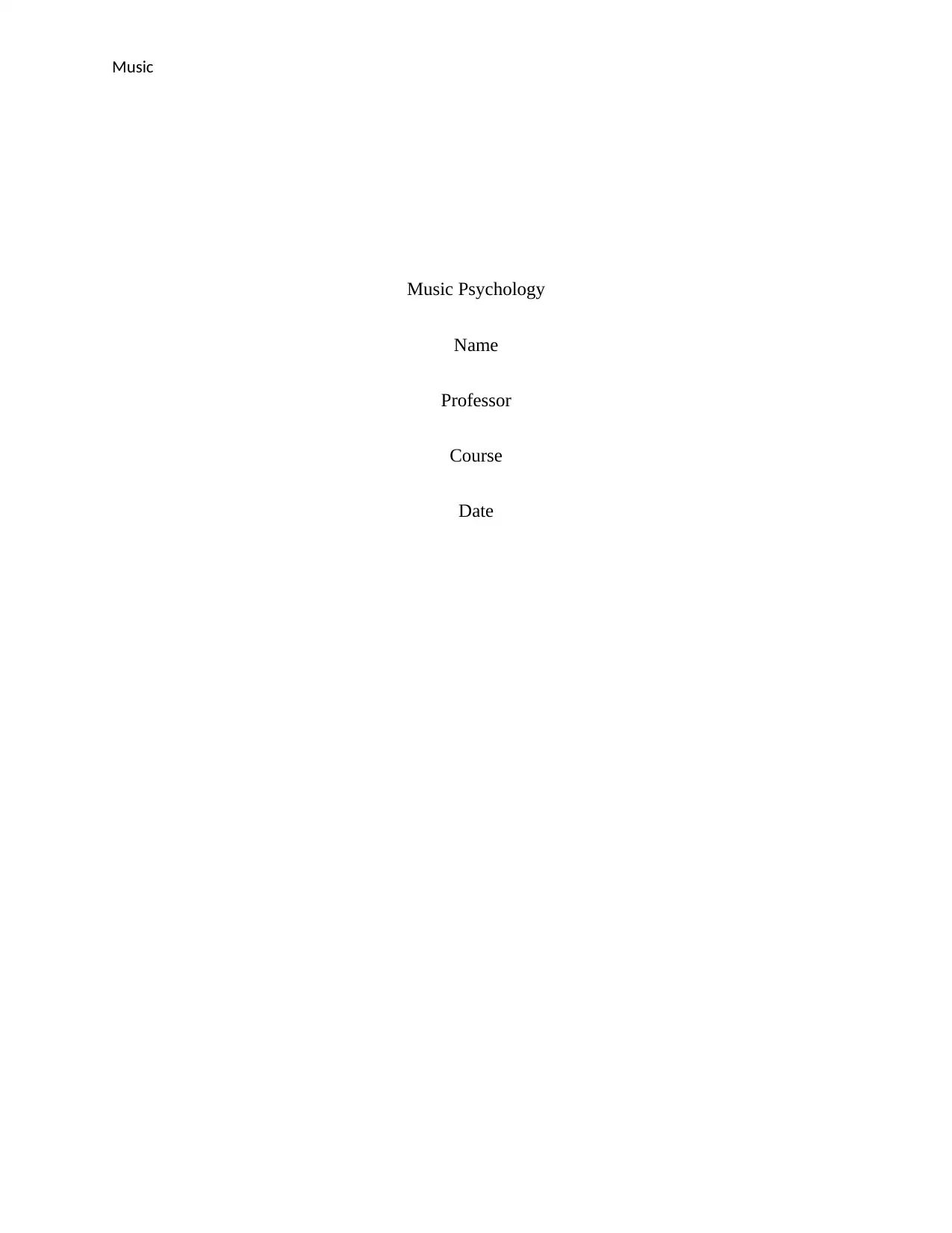
Music
Music Psychology
Name
Professor
Course
Date
Music Psychology
Name
Professor
Course
Date
Paraphrase This Document
Need a fresh take? Get an instant paraphrase of this document with our AI Paraphraser
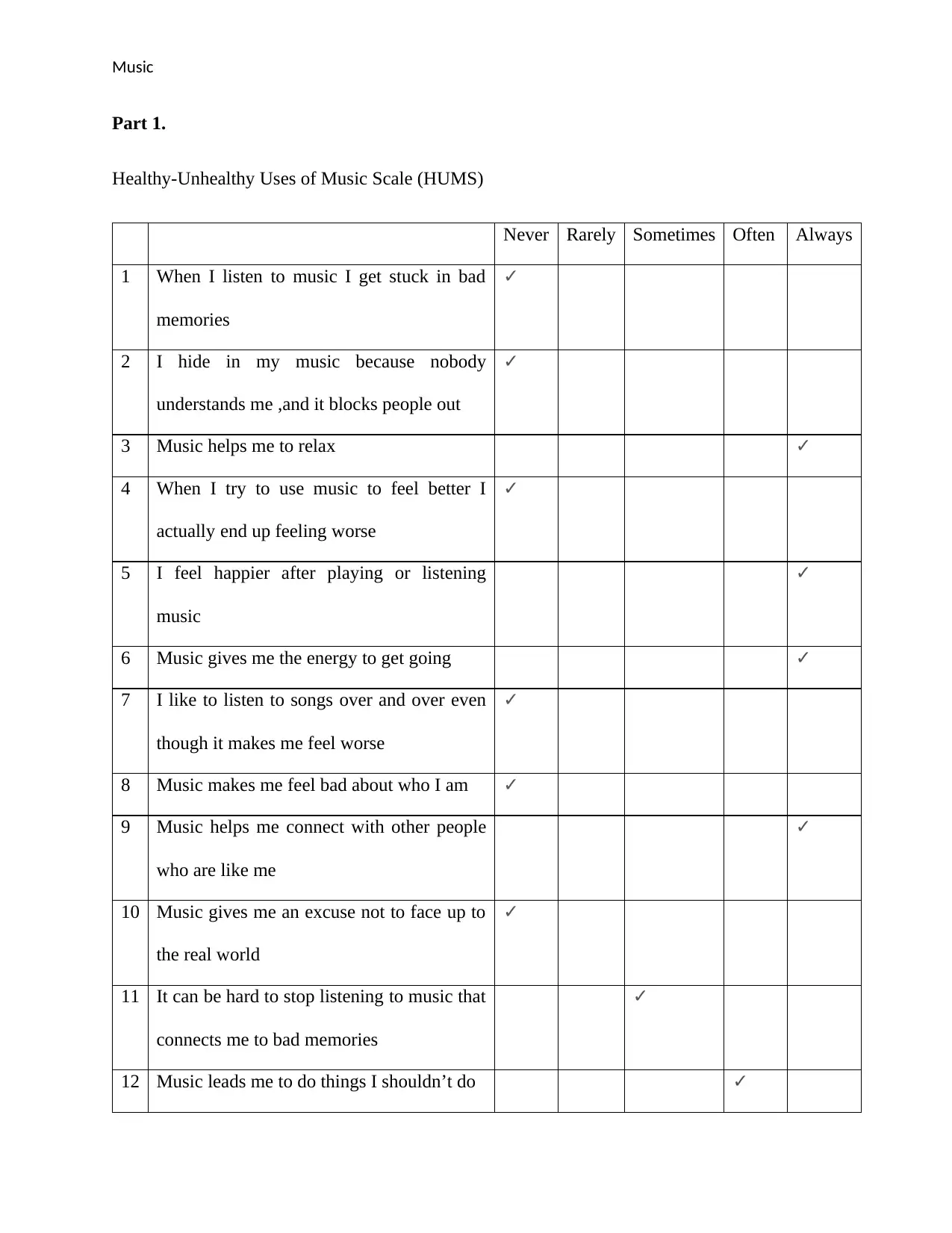
Music
Part 1.
Healthy-Unhealthy Uses of Music Scale (HUMS)
Never Rarely Sometimes Often Always
1 When I listen to music I get stuck in bad
memories
✓
2 I hide in my music because nobody
understands me ,and it blocks people out
✓
3 Music helps me to relax ✓
4 When I try to use music to feel better I
actually end up feeling worse
✓
5 I feel happier after playing or listening
music
✓
6 Music gives me the energy to get going ✓
7 I like to listen to songs over and over even
though it makes me feel worse
✓
8 Music makes me feel bad about who I am ✓
9 Music helps me connect with other people
who are like me
✓
10 Music gives me an excuse not to face up to
the real world
✓
11 It can be hard to stop listening to music that
connects me to bad memories
✓
12 Music leads me to do things I shouldn’t do ✓
Part 1.
Healthy-Unhealthy Uses of Music Scale (HUMS)
Never Rarely Sometimes Often Always
1 When I listen to music I get stuck in bad
memories
✓
2 I hide in my music because nobody
understands me ,and it blocks people out
✓
3 Music helps me to relax ✓
4 When I try to use music to feel better I
actually end up feeling worse
✓
5 I feel happier after playing or listening
music
✓
6 Music gives me the energy to get going ✓
7 I like to listen to songs over and over even
though it makes me feel worse
✓
8 Music makes me feel bad about who I am ✓
9 Music helps me connect with other people
who are like me
✓
10 Music gives me an excuse not to face up to
the real world
✓
11 It can be hard to stop listening to music that
connects me to bad memories
✓
12 Music leads me to do things I shouldn’t do ✓
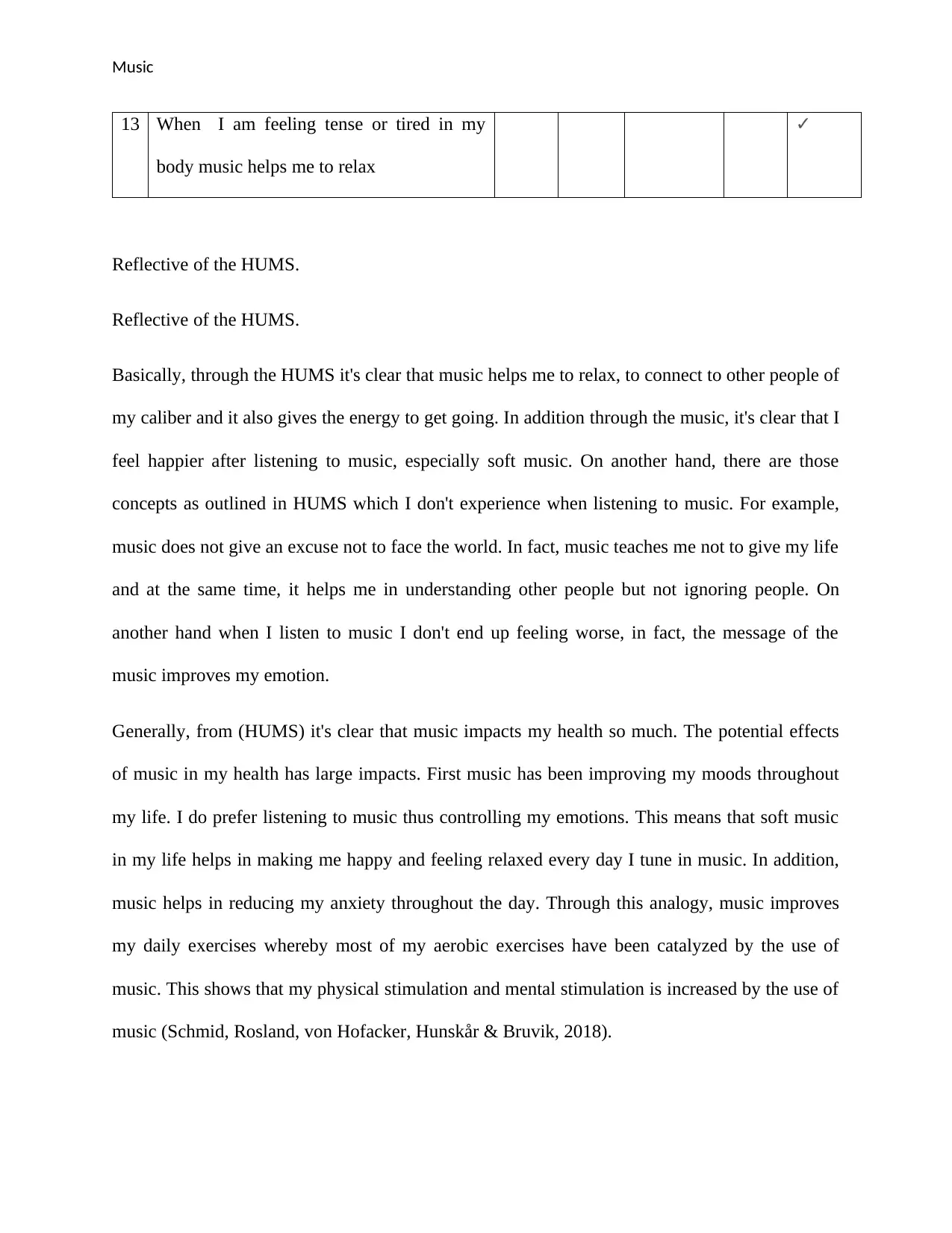
Music
13 When I am feeling tense or tired in my
body music helps me to relax
✓
Reflective of the HUMS.
Reflective of the HUMS.
Basically, through the HUMS it's clear that music helps me to relax, to connect to other people of
my caliber and it also gives the energy to get going. In addition through the music, it's clear that I
feel happier after listening to music, especially soft music. On another hand, there are those
concepts as outlined in HUMS which I don't experience when listening to music. For example,
music does not give an excuse not to face the world. In fact, music teaches me not to give my life
and at the same time, it helps me in understanding other people but not ignoring people. On
another hand when I listen to music I don't end up feeling worse, in fact, the message of the
music improves my emotion.
Generally, from (HUMS) it's clear that music impacts my health so much. The potential effects
of music in my health has large impacts. First music has been improving my moods throughout
my life. I do prefer listening to music thus controlling my emotions. This means that soft music
in my life helps in making me happy and feeling relaxed every day I tune in music. In addition,
music helps in reducing my anxiety throughout the day. Through this analogy, music improves
my daily exercises whereby most of my aerobic exercises have been catalyzed by the use of
music. This shows that my physical stimulation and mental stimulation is increased by the use of
music (Schmid, Rosland, von Hofacker, Hunskår & Bruvik, 2018).
13 When I am feeling tense or tired in my
body music helps me to relax
✓
Reflective of the HUMS.
Reflective of the HUMS.
Basically, through the HUMS it's clear that music helps me to relax, to connect to other people of
my caliber and it also gives the energy to get going. In addition through the music, it's clear that I
feel happier after listening to music, especially soft music. On another hand, there are those
concepts as outlined in HUMS which I don't experience when listening to music. For example,
music does not give an excuse not to face the world. In fact, music teaches me not to give my life
and at the same time, it helps me in understanding other people but not ignoring people. On
another hand when I listen to music I don't end up feeling worse, in fact, the message of the
music improves my emotion.
Generally, from (HUMS) it's clear that music impacts my health so much. The potential effects
of music in my health has large impacts. First music has been improving my moods throughout
my life. I do prefer listening to music thus controlling my emotions. This means that soft music
in my life helps in making me happy and feeling relaxed every day I tune in music. In addition,
music helps in reducing my anxiety throughout the day. Through this analogy, music improves
my daily exercises whereby most of my aerobic exercises have been catalyzed by the use of
music. This shows that my physical stimulation and mental stimulation is increased by the use of
music (Schmid, Rosland, von Hofacker, Hunskår & Bruvik, 2018).
⊘ This is a preview!⊘
Do you want full access?
Subscribe today to unlock all pages.

Trusted by 1+ million students worldwide
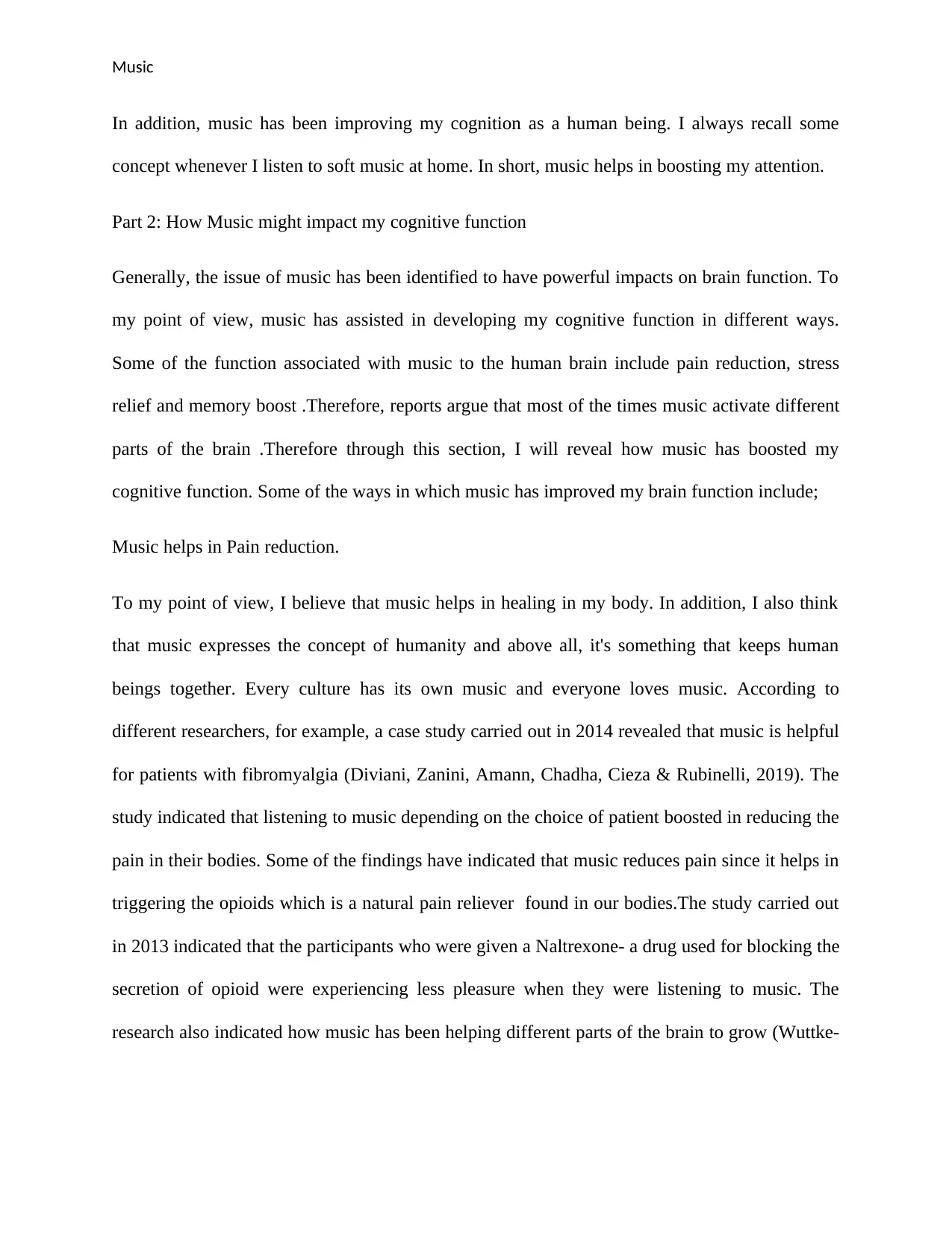
Music
In addition, music has been improving my cognition as a human being. I always recall some
concept whenever I listen to soft music at home. In short, music helps in boosting my attention.
Part 2: How Music might impact my cognitive function
Generally, the issue of music has been identified to have powerful impacts on brain function. To
my point of view, music has assisted in developing my cognitive function in different ways.
Some of the function associated with music to the human brain include pain reduction, stress
relief and memory boost .Therefore, reports argue that most of the times music activate different
parts of the brain .Therefore through this section, I will reveal how music has boosted my
cognitive function. Some of the ways in which music has improved my brain function include;
Music helps in Pain reduction.
To my point of view, I believe that music helps in healing in my body. In addition, I also think
that music expresses the concept of humanity and above all, it's something that keeps human
beings together. Every culture has its own music and everyone loves music. According to
different researchers, for example, a case study carried out in 2014 revealed that music is helpful
for patients with fibromyalgia (Diviani, Zanini, Amann, Chadha, Cieza & Rubinelli, 2019). The
study indicated that listening to music depending on the choice of patient boosted in reducing the
pain in their bodies. Some of the findings have indicated that music reduces pain since it helps in
triggering the opioids which is a natural pain reliever found in our bodies.The study carried out
in 2013 indicated that the participants who were given a Naltrexone- a drug used for blocking the
secretion of opioid were experiencing less pleasure when they were listening to music. The
research also indicated how music has been helping different parts of the brain to grow (Wuttke-
In addition, music has been improving my cognition as a human being. I always recall some
concept whenever I listen to soft music at home. In short, music helps in boosting my attention.
Part 2: How Music might impact my cognitive function
Generally, the issue of music has been identified to have powerful impacts on brain function. To
my point of view, music has assisted in developing my cognitive function in different ways.
Some of the function associated with music to the human brain include pain reduction, stress
relief and memory boost .Therefore, reports argue that most of the times music activate different
parts of the brain .Therefore through this section, I will reveal how music has boosted my
cognitive function. Some of the ways in which music has improved my brain function include;
Music helps in Pain reduction.
To my point of view, I believe that music helps in healing in my body. In addition, I also think
that music expresses the concept of humanity and above all, it's something that keeps human
beings together. Every culture has its own music and everyone loves music. According to
different researchers, for example, a case study carried out in 2014 revealed that music is helpful
for patients with fibromyalgia (Diviani, Zanini, Amann, Chadha, Cieza & Rubinelli, 2019). The
study indicated that listening to music depending on the choice of patient boosted in reducing the
pain in their bodies. Some of the findings have indicated that music reduces pain since it helps in
triggering the opioids which is a natural pain reliever found in our bodies.The study carried out
in 2013 indicated that the participants who were given a Naltrexone- a drug used for blocking the
secretion of opioid were experiencing less pleasure when they were listening to music. The
research also indicated how music has been helping different parts of the brain to grow (Wuttke-
Paraphrase This Document
Need a fresh take? Get an instant paraphrase of this document with our AI Paraphraser
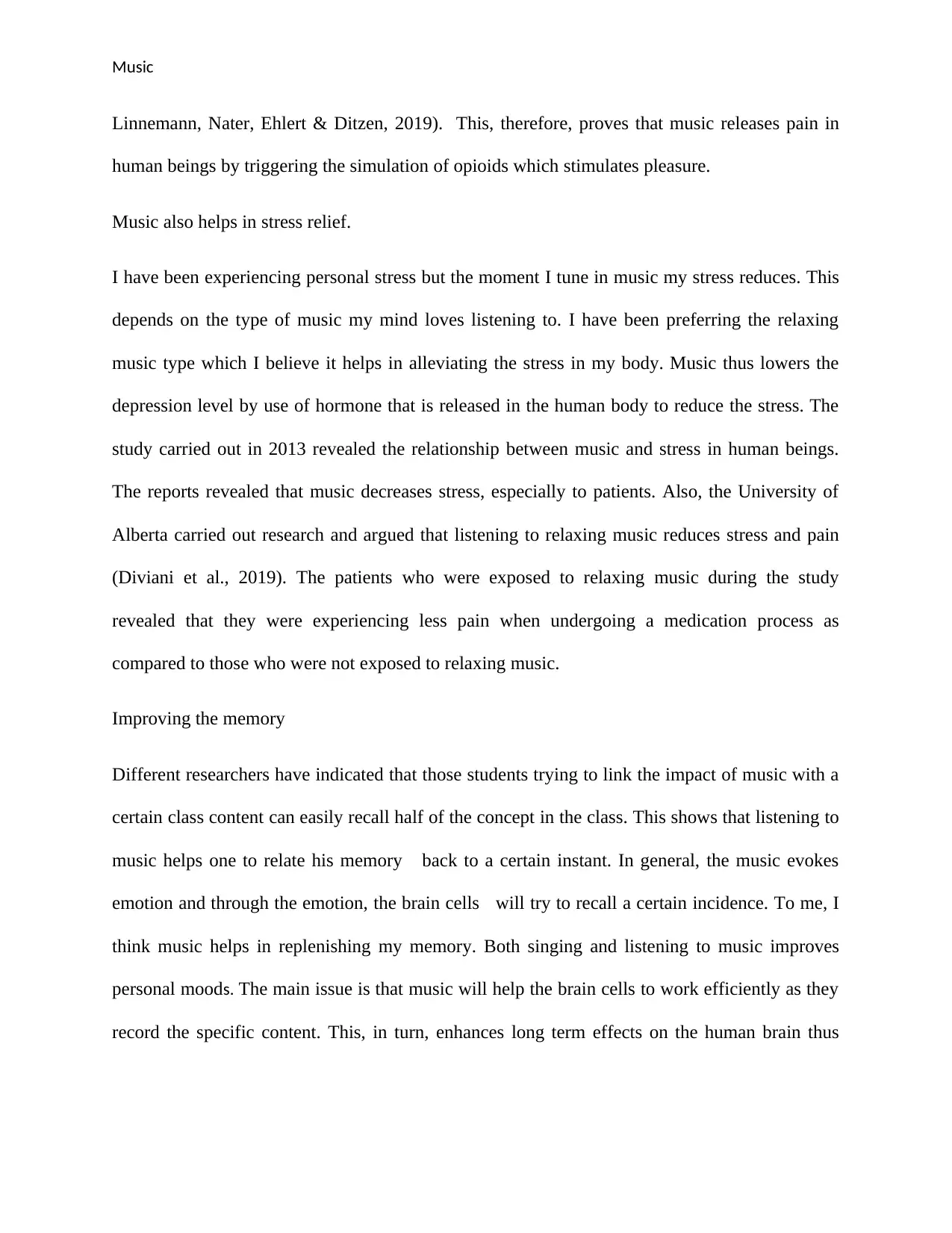
Music
Linnemann, Nater, Ehlert & Ditzen, 2019). This, therefore, proves that music releases pain in
human beings by triggering the simulation of opioids which stimulates pleasure.
Music also helps in stress relief.
I have been experiencing personal stress but the moment I tune in music my stress reduces. This
depends on the type of music my mind loves listening to. I have been preferring the relaxing
music type which I believe it helps in alleviating the stress in my body. Music thus lowers the
depression level by use of hormone that is released in the human body to reduce the stress. The
study carried out in 2013 revealed the relationship between music and stress in human beings.
The reports revealed that music decreases stress, especially to patients. Also, the University of
Alberta carried out research and argued that listening to relaxing music reduces stress and pain
(Diviani et al., 2019). The patients who were exposed to relaxing music during the study
revealed that they were experiencing less pain when undergoing a medication process as
compared to those who were not exposed to relaxing music.
Improving the memory
Different researchers have indicated that those students trying to link the impact of music with a
certain class content can easily recall half of the concept in the class. This shows that listening to
music helps one to relate his memory back to a certain instant. In general, the music evokes
emotion and through the emotion, the brain cells will try to recall a certain incidence. To me, I
think music helps in replenishing my memory. Both singing and listening to music improves
personal moods. The main issue is that music will help the brain cells to work efficiently as they
record the specific content. This, in turn, enhances long term effects on the human brain thus
Linnemann, Nater, Ehlert & Ditzen, 2019). This, therefore, proves that music releases pain in
human beings by triggering the simulation of opioids which stimulates pleasure.
Music also helps in stress relief.
I have been experiencing personal stress but the moment I tune in music my stress reduces. This
depends on the type of music my mind loves listening to. I have been preferring the relaxing
music type which I believe it helps in alleviating the stress in my body. Music thus lowers the
depression level by use of hormone that is released in the human body to reduce the stress. The
study carried out in 2013 revealed the relationship between music and stress in human beings.
The reports revealed that music decreases stress, especially to patients. Also, the University of
Alberta carried out research and argued that listening to relaxing music reduces stress and pain
(Diviani et al., 2019). The patients who were exposed to relaxing music during the study
revealed that they were experiencing less pain when undergoing a medication process as
compared to those who were not exposed to relaxing music.
Improving the memory
Different researchers have indicated that those students trying to link the impact of music with a
certain class content can easily recall half of the concept in the class. This shows that listening to
music helps one to relate his memory back to a certain instant. In general, the music evokes
emotion and through the emotion, the brain cells will try to recall a certain incidence. To me, I
think music helps in replenishing my memory. Both singing and listening to music improves
personal moods. The main issue is that music will help the brain cells to work efficiently as they
record the specific content. This, in turn, enhances long term effects on the human brain thus
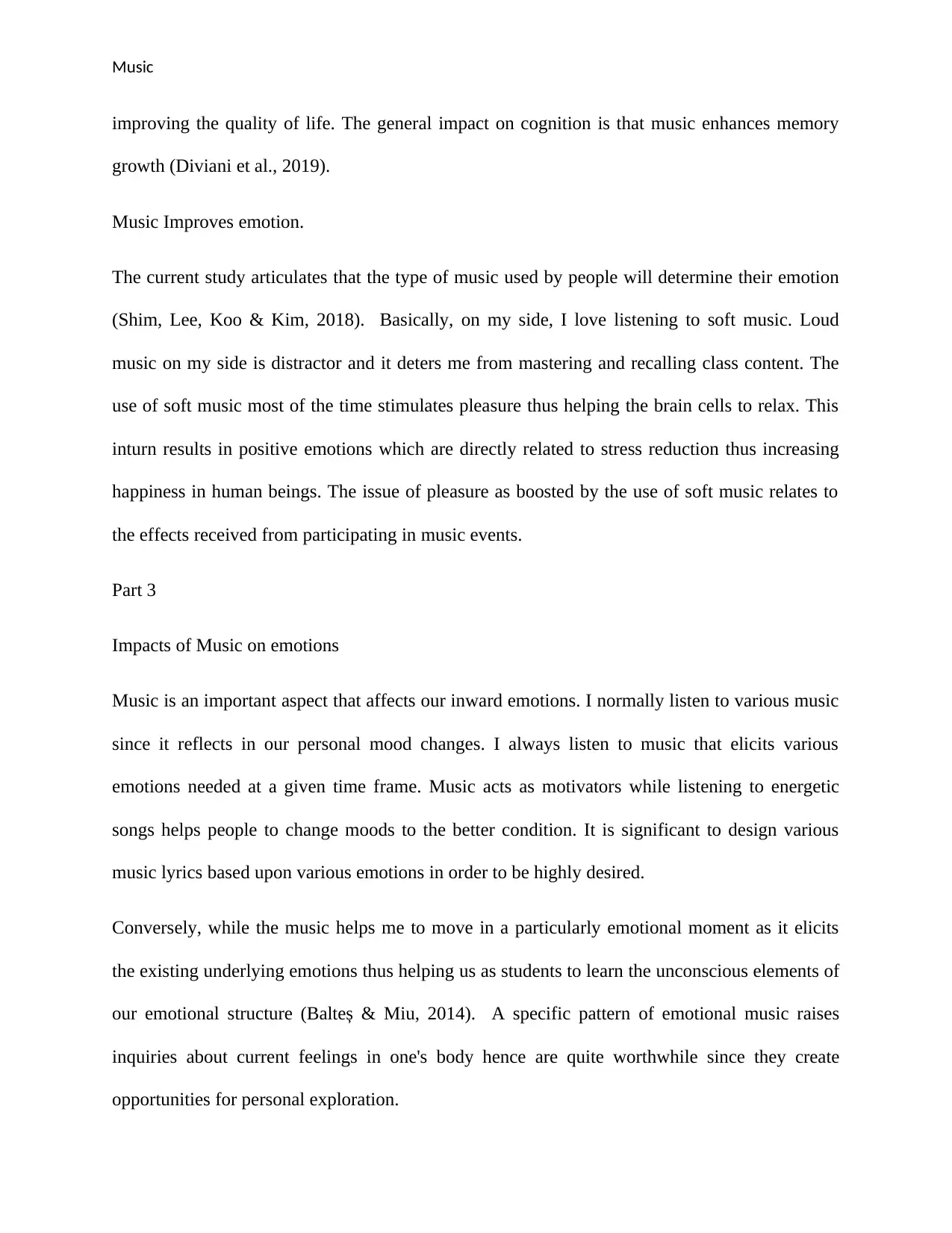
Music
improving the quality of life. The general impact on cognition is that music enhances memory
growth (Diviani et al., 2019).
Music Improves emotion.
The current study articulates that the type of music used by people will determine their emotion
(Shim, Lee, Koo & Kim, 2018). Basically, on my side, I love listening to soft music. Loud
music on my side is distractor and it deters me from mastering and recalling class content. The
use of soft music most of the time stimulates pleasure thus helping the brain cells to relax. This
inturn results in positive emotions which are directly related to stress reduction thus increasing
happiness in human beings. The issue of pleasure as boosted by the use of soft music relates to
the effects received from participating in music events.
Part 3
Impacts of Music on emotions
Music is an important aspect that affects our inward emotions. I normally listen to various music
since it reflects in our personal mood changes. I always listen to music that elicits various
emotions needed at a given time frame. Music acts as motivators while listening to energetic
songs helps people to change moods to the better condition. It is significant to design various
music lyrics based upon various emotions in order to be highly desired.
Conversely, while the music helps me to move in a particularly emotional moment as it elicits
the existing underlying emotions thus helping us as students to learn the unconscious elements of
our emotional structure (Balteș & Miu, 2014). A specific pattern of emotional music raises
inquiries about current feelings in one's body hence are quite worthwhile since they create
opportunities for personal exploration.
improving the quality of life. The general impact on cognition is that music enhances memory
growth (Diviani et al., 2019).
Music Improves emotion.
The current study articulates that the type of music used by people will determine their emotion
(Shim, Lee, Koo & Kim, 2018). Basically, on my side, I love listening to soft music. Loud
music on my side is distractor and it deters me from mastering and recalling class content. The
use of soft music most of the time stimulates pleasure thus helping the brain cells to relax. This
inturn results in positive emotions which are directly related to stress reduction thus increasing
happiness in human beings. The issue of pleasure as boosted by the use of soft music relates to
the effects received from participating in music events.
Part 3
Impacts of Music on emotions
Music is an important aspect that affects our inward emotions. I normally listen to various music
since it reflects in our personal mood changes. I always listen to music that elicits various
emotions needed at a given time frame. Music acts as motivators while listening to energetic
songs helps people to change moods to the better condition. It is significant to design various
music lyrics based upon various emotions in order to be highly desired.
Conversely, while the music helps me to move in a particularly emotional moment as it elicits
the existing underlying emotions thus helping us as students to learn the unconscious elements of
our emotional structure (Balteș & Miu, 2014). A specific pattern of emotional music raises
inquiries about current feelings in one's body hence are quite worthwhile since they create
opportunities for personal exploration.
⊘ This is a preview!⊘
Do you want full access?
Subscribe today to unlock all pages.

Trusted by 1+ million students worldwide
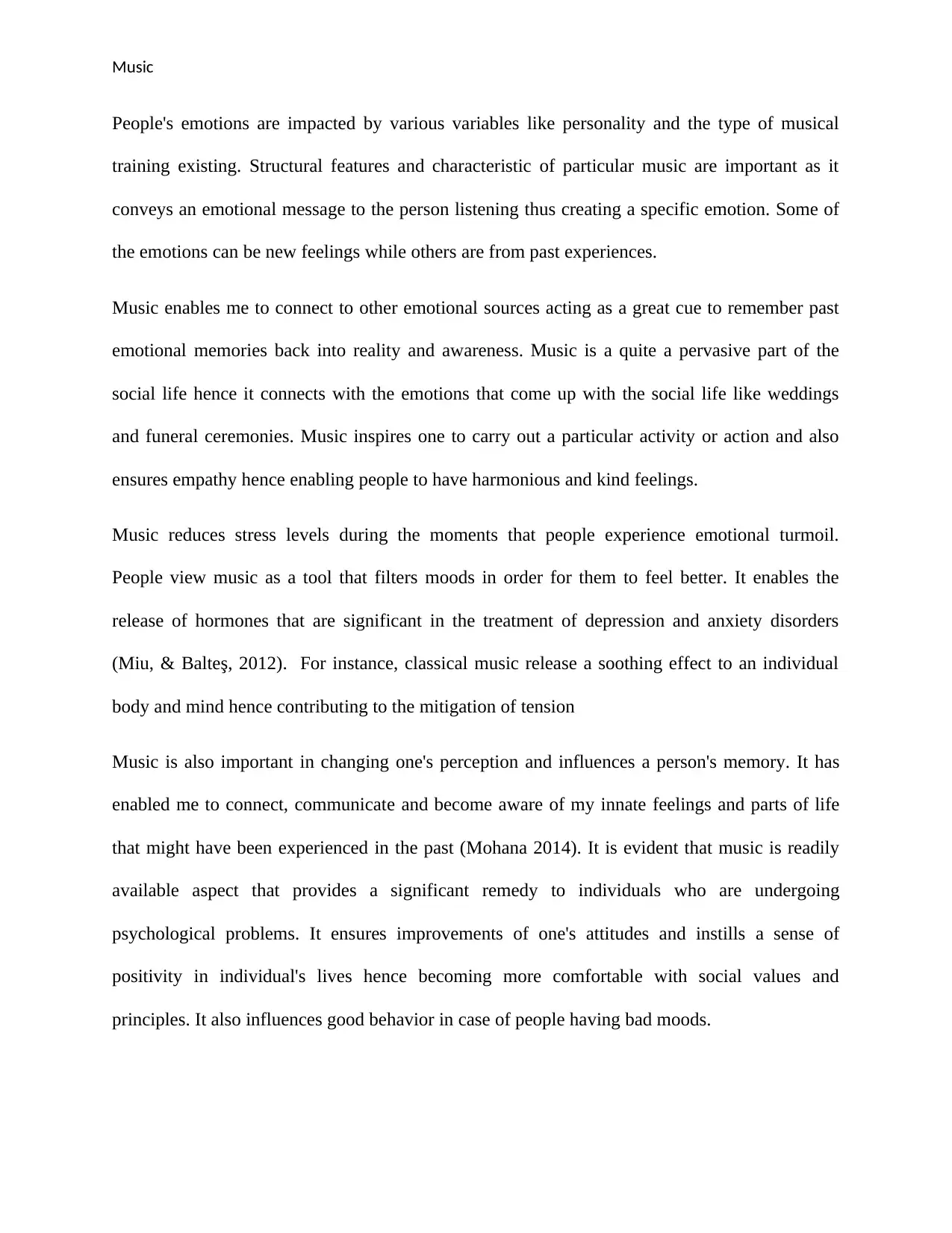
Music
People's emotions are impacted by various variables like personality and the type of musical
training existing. Structural features and characteristic of particular music are important as it
conveys an emotional message to the person listening thus creating a specific emotion. Some of
the emotions can be new feelings while others are from past experiences.
Music enables me to connect to other emotional sources acting as a great cue to remember past
emotional memories back into reality and awareness. Music is a quite a pervasive part of the
social life hence it connects with the emotions that come up with the social life like weddings
and funeral ceremonies. Music inspires one to carry out a particular activity or action and also
ensures empathy hence enabling people to have harmonious and kind feelings.
Music reduces stress levels during the moments that people experience emotional turmoil.
People view music as a tool that filters moods in order for them to feel better. It enables the
release of hormones that are significant in the treatment of depression and anxiety disorders
(Miu, & Balteş, 2012). For instance, classical music release a soothing effect to an individual
body and mind hence contributing to the mitigation of tension
Music is also important in changing one's perception and influences a person's memory. It has
enabled me to connect, communicate and become aware of my innate feelings and parts of life
that might have been experienced in the past (Mohana 2014). It is evident that music is readily
available aspect that provides a significant remedy to individuals who are undergoing
psychological problems. It ensures improvements of one's attitudes and instills a sense of
positivity in individual's lives hence becoming more comfortable with social values and
principles. It also influences good behavior in case of people having bad moods.
People's emotions are impacted by various variables like personality and the type of musical
training existing. Structural features and characteristic of particular music are important as it
conveys an emotional message to the person listening thus creating a specific emotion. Some of
the emotions can be new feelings while others are from past experiences.
Music enables me to connect to other emotional sources acting as a great cue to remember past
emotional memories back into reality and awareness. Music is a quite a pervasive part of the
social life hence it connects with the emotions that come up with the social life like weddings
and funeral ceremonies. Music inspires one to carry out a particular activity or action and also
ensures empathy hence enabling people to have harmonious and kind feelings.
Music reduces stress levels during the moments that people experience emotional turmoil.
People view music as a tool that filters moods in order for them to feel better. It enables the
release of hormones that are significant in the treatment of depression and anxiety disorders
(Miu, & Balteş, 2012). For instance, classical music release a soothing effect to an individual
body and mind hence contributing to the mitigation of tension
Music is also important in changing one's perception and influences a person's memory. It has
enabled me to connect, communicate and become aware of my innate feelings and parts of life
that might have been experienced in the past (Mohana 2014). It is evident that music is readily
available aspect that provides a significant remedy to individuals who are undergoing
psychological problems. It ensures improvements of one's attitudes and instills a sense of
positivity in individual's lives hence becoming more comfortable with social values and
principles. It also influences good behavior in case of people having bad moods.
Paraphrase This Document
Need a fresh take? Get an instant paraphrase of this document with our AI Paraphraser
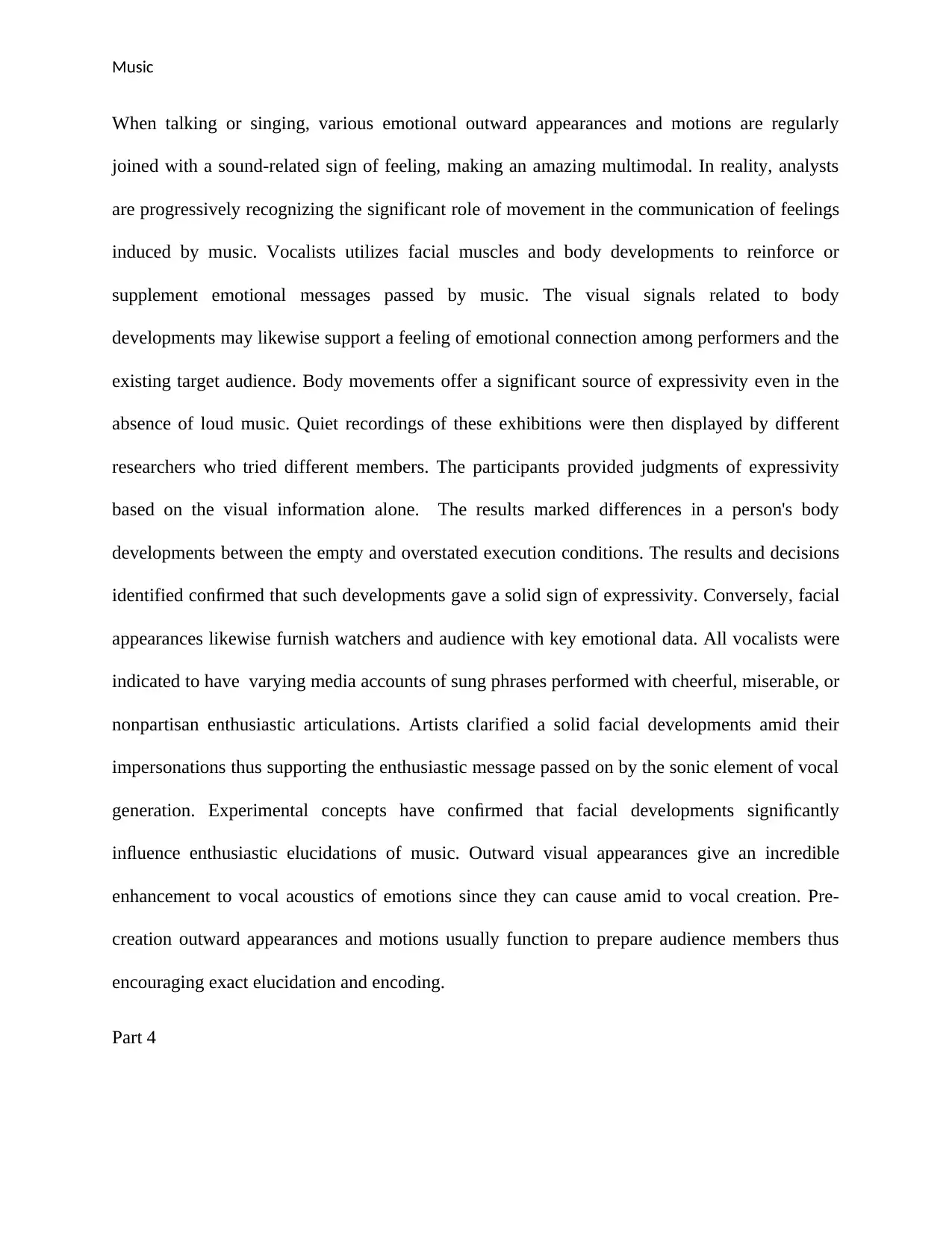
Music
When talking or singing, various emotional outward appearances and motions are regularly
joined with a sound-related sign of feeling, making an amazing multimodal. In reality, analysts
are progressively recognizing the significant role of movement in the communication of feelings
induced by music. Vocalists utilizes facial muscles and body developments to reinforce or
supplement emotional messages passed by music. The visual signals related to body
developments may likewise support a feeling of emotional connection among performers and the
existing target audience. Body movements offer a significant source of expressivity even in the
absence of loud music. Quiet recordings of these exhibitions were then displayed by different
researchers who tried different members. The participants provided judgments of expressivity
based on the visual information alone. The results marked differences in a person's body
developments between the empty and overstated execution conditions. The results and decisions
identified confirmed that such developments gave a solid sign of expressivity. Conversely, facial
appearances likewise furnish watchers and audience with key emotional data. All vocalists were
indicated to have varying media accounts of sung phrases performed with cheerful, miserable, or
nonpartisan enthusiastic articulations. Artists clarified a solid facial developments amid their
impersonations thus supporting the enthusiastic message passed on by the sonic element of vocal
generation. Experimental concepts have confirmed that facial developments significantly
influence enthusiastic elucidations of music. Outward visual appearances give an incredible
enhancement to vocal acoustics of emotions since they can cause amid to vocal creation. Pre-
creation outward appearances and motions usually function to prepare audience members thus
encouraging exact elucidation and encoding.
Part 4
When talking or singing, various emotional outward appearances and motions are regularly
joined with a sound-related sign of feeling, making an amazing multimodal. In reality, analysts
are progressively recognizing the significant role of movement in the communication of feelings
induced by music. Vocalists utilizes facial muscles and body developments to reinforce or
supplement emotional messages passed by music. The visual signals related to body
developments may likewise support a feeling of emotional connection among performers and the
existing target audience. Body movements offer a significant source of expressivity even in the
absence of loud music. Quiet recordings of these exhibitions were then displayed by different
researchers who tried different members. The participants provided judgments of expressivity
based on the visual information alone. The results marked differences in a person's body
developments between the empty and overstated execution conditions. The results and decisions
identified confirmed that such developments gave a solid sign of expressivity. Conversely, facial
appearances likewise furnish watchers and audience with key emotional data. All vocalists were
indicated to have varying media accounts of sung phrases performed with cheerful, miserable, or
nonpartisan enthusiastic articulations. Artists clarified a solid facial developments amid their
impersonations thus supporting the enthusiastic message passed on by the sonic element of vocal
generation. Experimental concepts have confirmed that facial developments significantly
influence enthusiastic elucidations of music. Outward visual appearances give an incredible
enhancement to vocal acoustics of emotions since they can cause amid to vocal creation. Pre-
creation outward appearances and motions usually function to prepare audience members thus
encouraging exact elucidation and encoding.
Part 4
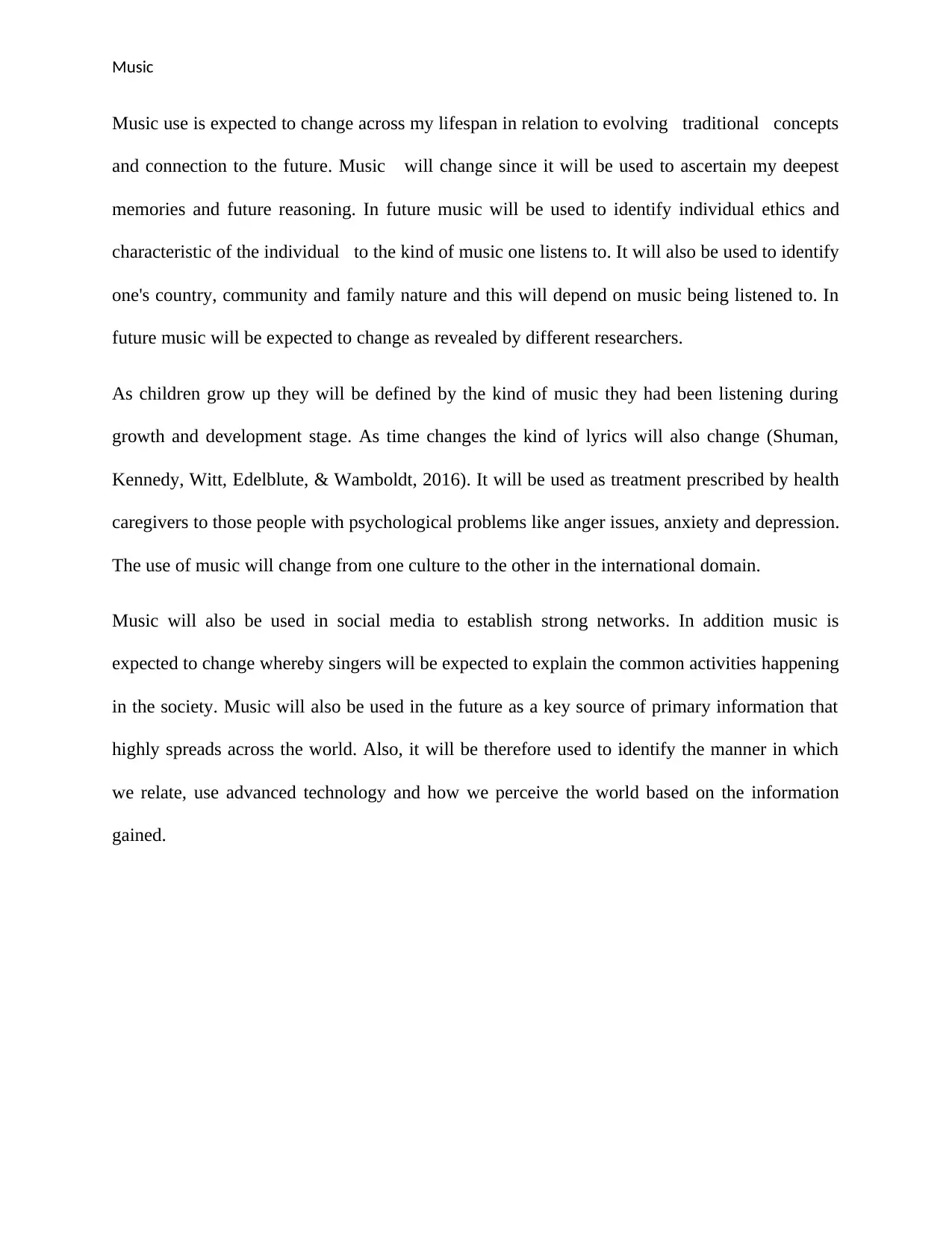
Music
Music use is expected to change across my lifespan in relation to evolving traditional concepts
and connection to the future. Music will change since it will be used to ascertain my deepest
memories and future reasoning. In future music will be used to identify individual ethics and
characteristic of the individual to the kind of music one listens to. It will also be used to identify
one's country, community and family nature and this will depend on music being listened to. In
future music will be expected to change as revealed by different researchers.
As children grow up they will be defined by the kind of music they had been listening during
growth and development stage. As time changes the kind of lyrics will also change (Shuman,
Kennedy, Witt, Edelblute, & Wamboldt, 2016). It will be used as treatment prescribed by health
caregivers to those people with psychological problems like anger issues, anxiety and depression.
The use of music will change from one culture to the other in the international domain.
Music will also be used in social media to establish strong networks. In addition music is
expected to change whereby singers will be expected to explain the common activities happening
in the society. Music will also be used in the future as a key source of primary information that
highly spreads across the world. Also, it will be therefore used to identify the manner in which
we relate, use advanced technology and how we perceive the world based on the information
gained.
Music use is expected to change across my lifespan in relation to evolving traditional concepts
and connection to the future. Music will change since it will be used to ascertain my deepest
memories and future reasoning. In future music will be used to identify individual ethics and
characteristic of the individual to the kind of music one listens to. It will also be used to identify
one's country, community and family nature and this will depend on music being listened to. In
future music will be expected to change as revealed by different researchers.
As children grow up they will be defined by the kind of music they had been listening during
growth and development stage. As time changes the kind of lyrics will also change (Shuman,
Kennedy, Witt, Edelblute, & Wamboldt, 2016). It will be used as treatment prescribed by health
caregivers to those people with psychological problems like anger issues, anxiety and depression.
The use of music will change from one culture to the other in the international domain.
Music will also be used in social media to establish strong networks. In addition music is
expected to change whereby singers will be expected to explain the common activities happening
in the society. Music will also be used in the future as a key source of primary information that
highly spreads across the world. Also, it will be therefore used to identify the manner in which
we relate, use advanced technology and how we perceive the world based on the information
gained.
⊘ This is a preview!⊘
Do you want full access?
Subscribe today to unlock all pages.

Trusted by 1+ million students worldwide
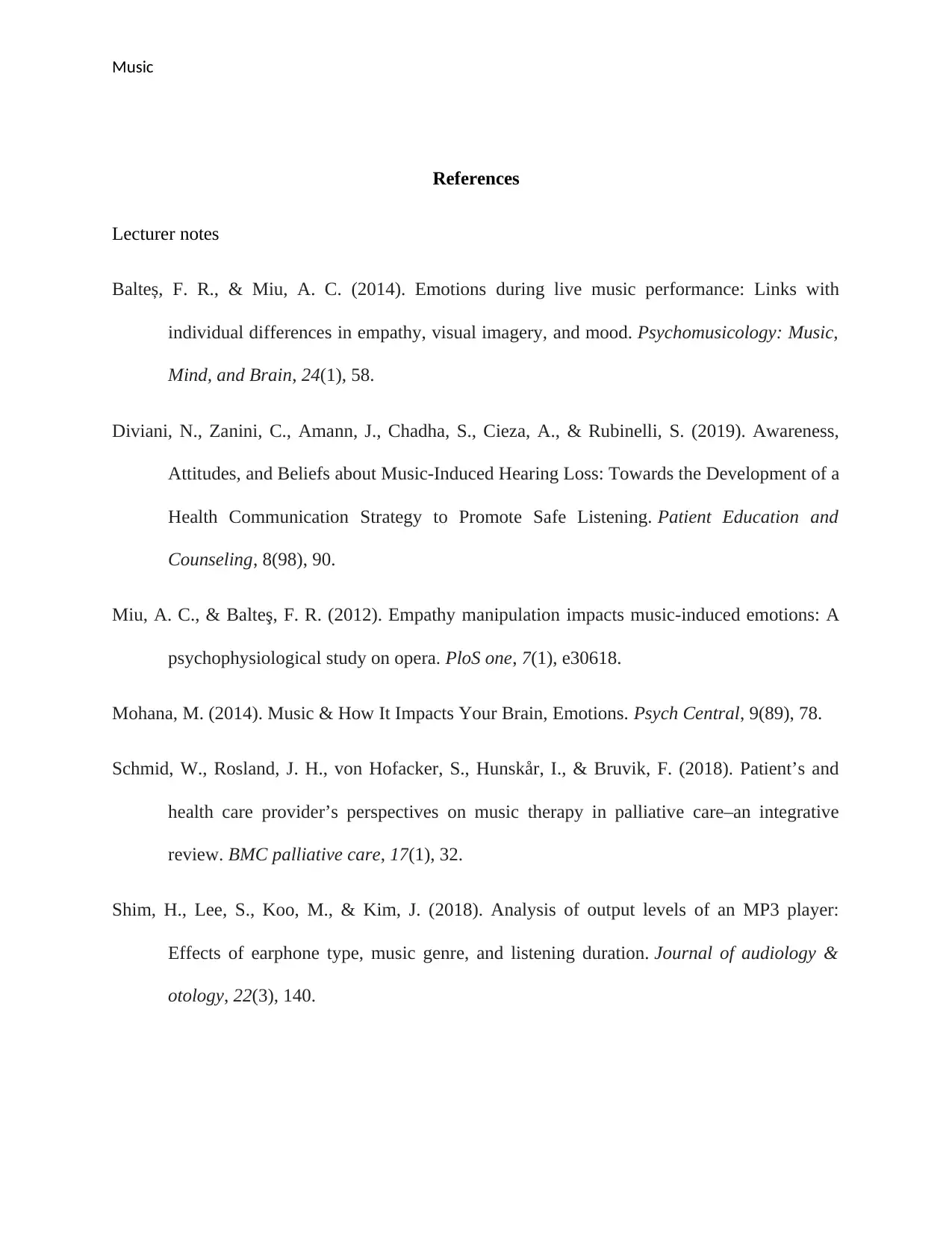
Music
References
Lecturer notes
Balteș, F. R., & Miu, A. C. (2014). Emotions during live music performance: Links with
individual differences in empathy, visual imagery, and mood. Psychomusicology: Music,
Mind, and Brain, 24(1), 58.
Diviani, N., Zanini, C., Amann, J., Chadha, S., Cieza, A., & Rubinelli, S. (2019). Awareness,
Attitudes, and Beliefs about Music-Induced Hearing Loss: Towards the Development of a
Health Communication Strategy to Promote Safe Listening. Patient Education and
Counseling, 8(98), 90.
Miu, A. C., & Balteş, F. R. (2012). Empathy manipulation impacts music-induced emotions: A
psychophysiological study on opera. PloS one, 7(1), e30618.
Mohana, M. (2014). Music & How It Impacts Your Brain, Emotions. Psych Central, 9(89), 78.
Schmid, W., Rosland, J. H., von Hofacker, S., Hunskår, I., & Bruvik, F. (2018). Patient’s and
health care provider’s perspectives on music therapy in palliative care–an integrative
review. BMC palliative care, 17(1), 32.
Shim, H., Lee, S., Koo, M., & Kim, J. (2018). Analysis of output levels of an MP3 player:
Effects of earphone type, music genre, and listening duration. Journal of audiology &
otology, 22(3), 140.
References
Lecturer notes
Balteș, F. R., & Miu, A. C. (2014). Emotions during live music performance: Links with
individual differences in empathy, visual imagery, and mood. Psychomusicology: Music,
Mind, and Brain, 24(1), 58.
Diviani, N., Zanini, C., Amann, J., Chadha, S., Cieza, A., & Rubinelli, S. (2019). Awareness,
Attitudes, and Beliefs about Music-Induced Hearing Loss: Towards the Development of a
Health Communication Strategy to Promote Safe Listening. Patient Education and
Counseling, 8(98), 90.
Miu, A. C., & Balteş, F. R. (2012). Empathy manipulation impacts music-induced emotions: A
psychophysiological study on opera. PloS one, 7(1), e30618.
Mohana, M. (2014). Music & How It Impacts Your Brain, Emotions. Psych Central, 9(89), 78.
Schmid, W., Rosland, J. H., von Hofacker, S., Hunskår, I., & Bruvik, F. (2018). Patient’s and
health care provider’s perspectives on music therapy in palliative care–an integrative
review. BMC palliative care, 17(1), 32.
Shim, H., Lee, S., Koo, M., & Kim, J. (2018). Analysis of output levels of an MP3 player:
Effects of earphone type, music genre, and listening duration. Journal of audiology &
otology, 22(3), 140.
Paraphrase This Document
Need a fresh take? Get an instant paraphrase of this document with our AI Paraphraser
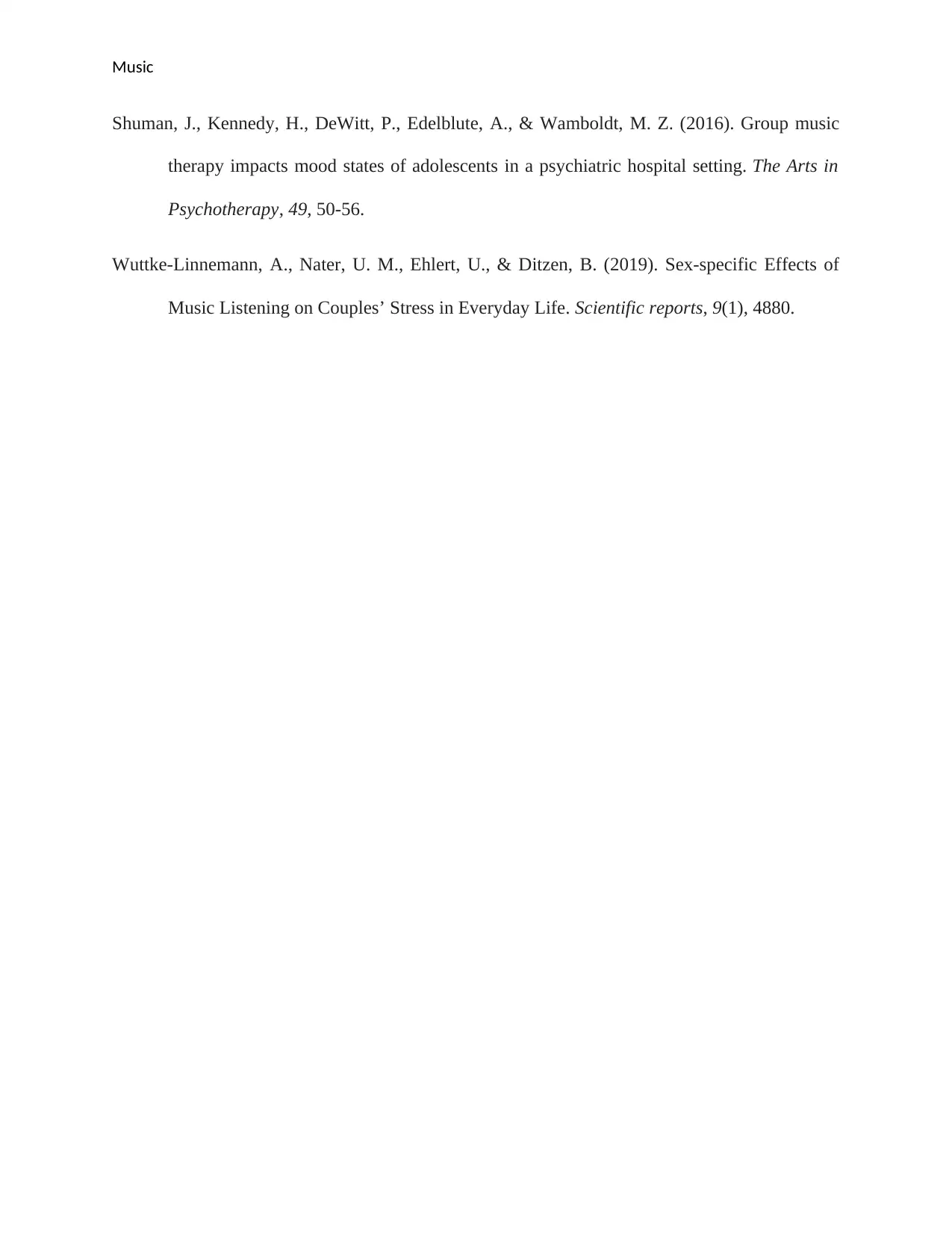
Music
Shuman, J., Kennedy, H., DeWitt, P., Edelblute, A., & Wamboldt, M. Z. (2016). Group music
therapy impacts mood states of adolescents in a psychiatric hospital setting. The Arts in
Psychotherapy, 49, 50-56.
Wuttke-Linnemann, A., Nater, U. M., Ehlert, U., & Ditzen, B. (2019). Sex-specific Effects of
Music Listening on Couples’ Stress in Everyday Life. Scientific reports, 9(1), 4880.
Shuman, J., Kennedy, H., DeWitt, P., Edelblute, A., & Wamboldt, M. Z. (2016). Group music
therapy impacts mood states of adolescents in a psychiatric hospital setting. The Arts in
Psychotherapy, 49, 50-56.
Wuttke-Linnemann, A., Nater, U. M., Ehlert, U., & Ditzen, B. (2019). Sex-specific Effects of
Music Listening on Couples’ Stress in Everyday Life. Scientific reports, 9(1), 4880.
1 out of 11
Related Documents
Your All-in-One AI-Powered Toolkit for Academic Success.
+13062052269
info@desklib.com
Available 24*7 on WhatsApp / Email
![[object Object]](/_next/static/media/star-bottom.7253800d.svg)
Unlock your academic potential
Copyright © 2020–2026 A2Z Services. All Rights Reserved. Developed and managed by ZUCOL.





